The B-Mitzvah walks across the bridge from childhood to young adulthood. It’s our Jewish way of accepting growth and inviting our teens into the community of adults. Grandparents can cross the bridge with them. We can engage with them, encourage them, and enjoy each other as we make this journey together.
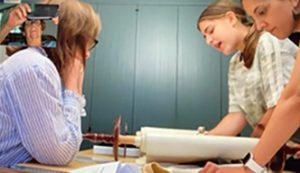 I had the privilege of studying along with two of my grandchildren — one afternoon a week for three years — as each of them prepared to become B-Mitzvah. It was hard work for them. After a long day at school, they learned to read Hebrew, to chant the prayers, to sing the tropes, to chant the parsha, and to prepare a little speech.
I had the privilege of studying along with two of my grandchildren — one afternoon a week for three years — as each of them prepared to become B-Mitzvah. It was hard work for them. After a long day at school, they learned to read Hebrew, to chant the prayers, to sing the tropes, to chant the parsha, and to prepare a little speech.
I sat at the dining-room table with them in their apartment or mine week after week, and studied with them, with such pleasure. I was there to reassure my grandchild and to lend a loving presence. Sometimes I offered an interpretation or a story, but mostly I sat and listened and watched and glowed. Occasionally, we would share looks when the tutor was silly. And we had cookies or bagels with lox when the lesson was done.
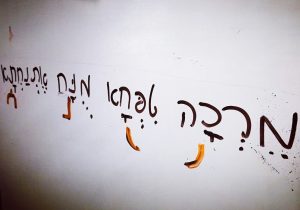 This process is not easy for the B-Mitzvah teen. And it is not always fun. Many kids prepare to become B-Mitzvah for their family, or out of respect for the Jewish tradition. I don’t think they do it for the party and the gifts. Are months, or even years, of one afternoon a week studying worth a party and some presents? My grandchildren earned my respect, long before the ceremony.
This process is not easy for the B-Mitzvah teen. And it is not always fun. Many kids prepare to become B-Mitzvah for their family, or out of respect for the Jewish tradition. I don’t think they do it for the party and the gifts. Are months, or even years, of one afternoon a week studying worth a party and some presents? My grandchildren earned my respect, long before the ceremony.
Here are some ways we can help enrich our grandchildren’s B-Mitzvah experience.
Listen carefully in order to understand how the teen is feeling.
One of my grandchildren, practicing chanting the Amidah, whispered to me, “I don’t believe in God.” Actually, neither do I. I told him so. He was surprised. I was being honest and introducing him into the great Jewish tradition of learning and then challenging.
You may not want to discuss theology with a twelve- or thirteen-year-old. But remember how glad they are when you respect their feelings and ideas. You can connect with their worries by telling of your slips — maybe a story from your own rite of passage or from their parent’s B-Mitzvah. This is a time of stress for the B-Mitzvah and our job is to offer reassurance.
Read your grandchild’s parsha so that you can discuss it with them.
My oldest grandchild’s parsha was the death of Moses. When the tutor asked why the Torah says Moses wept when God showed Moses the Holy Land from afar, Benji first said Moses might have been sad that he was about to die and could not enter the Promised Land. Then Benji changed his mind. “Maybe they are tears of joy,” he said. “When Moses saw where and how his people would live, he was so glad that he cried.”
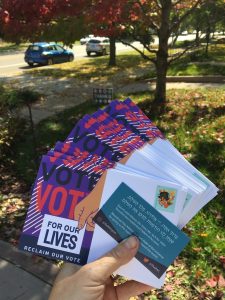 A great teaching of our tradition is that grandparents will learn from their grandchildren.
A great teaching of our tradition is that grandparents will learn from their grandchildren.
Connect with your grandchild through tzedakah.
Think together about a mitzvah project you both care about. If your grandchild has trouble thinking of ideas, as many kids do, tell them some of your passions — kindness, equal justice, feeding the hungry, welcoming the stranger, sustaining the earth. Explore your shared values and find the need that speaks most directly to the B-Mitzvah, so that the project is truly meaningful.
If you are able, take your B-Mitzvah grandchild to Israel.
Israel is the homeland of the Jewish people, the one place where we will always be welcome. If you can, take the child with you to Israel, and if you can’t, maybe suggest — or, if you have the means, underwrite — a future teen tour to the Holy Land.
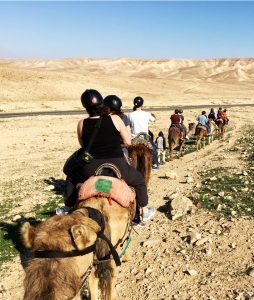
![]() Click HERE to read more about trips to Israel.
Click HERE to read more about trips to Israel.
If neither of those works, you can always discuss Israel together — the history, politics, religion, how Israel is depicted in the news. Perhaps your grandchild has heard criticism of Israeli policies. Bring it on. For an adolescent, everything is up for questioning and discussion. Challenging authority is their middle name. We Jews have been discussing and arguing from the very beginning. If you believe that the future of Israel and the Jewish people are intertwined, then an honest conversation may lead to important results.
Tell family stories.
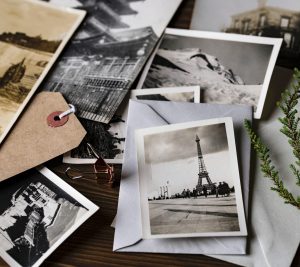 Our history, the stories of our parents and grandparents, the stories of their parents, and our own stories — we love to tell them, and they take on deep significance at this moment. So tell your teen some family stories with an eye to what they are experiencing as they prepare to become B-Mitzvah. As your grandchild makes the great effort to study and to represent themselves and the family well, tell some stories of your family’s struggles. For example, what did your grandparents have to overcome? Share their lessons.
Our history, the stories of our parents and grandparents, the stories of their parents, and our own stories — we love to tell them, and they take on deep significance at this moment. So tell your teen some family stories with an eye to what they are experiencing as they prepare to become B-Mitzvah. As your grandchild makes the great effort to study and to represent themselves and the family well, tell some stories of your family’s struggles. For example, what did your grandparents have to overcome? Share their lessons.
Show, with all your heart, that your grandchild is your blessing, your future, your legacy.
The pure joy of sharing this life experience can power us through our days and months. Make sure that you let the B-Mitzvah know how happy, how proud, and how joyful you are.
As grandparents we embody continuity. If we hand the Torah from grandparents to parents to grandchildren we enter with them into the great chain of Judaism, from the patriarchs, to Sinai, to this sacred moment.
You don’t have to be a rabbi to deepen this experience with your grandchildren. Not even a scholar. A loving, accepting grandparent who encourages the B-Mitzvah and offers unconditional love is everything.
A year after my granddaughter’s B-Mitzvah I asked her how she felt about it.
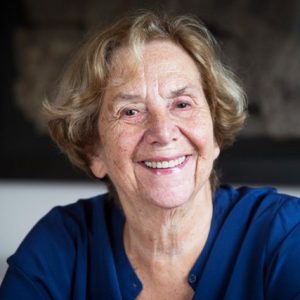 “I did it for my family,” she said, “I didn’t love it, but it was important.”
“I did it for my family,” she said, “I didn’t love it, but it was important.”
“What did you take away?” I asked.
“The Sh’ma,” she said.
Dayeinu.
Jane Isay is author of four books, most recently Unconditional Love: A Guide to Navigating the Joys and Challenges of being a Grandparent Today. Learn more at http://www.janeisay.com/. Jane lives in New York, close to her four grandchildren.
Photographic Credits
Banner by True Photography & Video
Jane Isay with grandchildren on Zoom by Jane Isay
Trope, mitzvah cards, and camels by Stephanie Fink
Old photos courtesy of Unsplash
Jane Isay by Harvey Wang

